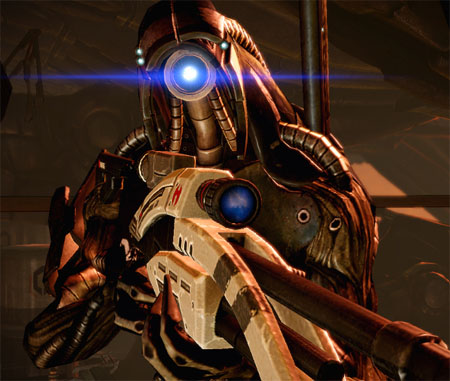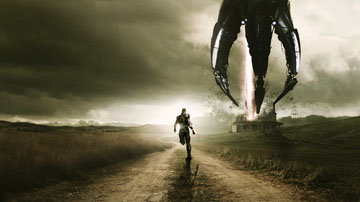
The soulfulness and evil seen in robots in Xenoblade Chronicles and Mass Effect 3 is an interesting entry into the ongoing conversation of what constitutes a person. In part because we enter into it with what is, really, another machine: the video game system.
Since "Frankenstein," our culture has been in conversation about whether we can create something with a soul. Did Frankenstein's monster have a soul? How about the Cylons of Battlestar Galactica? The Androsynth of Star Control II? Or Wall-E?
Two recent video games narratives have fed into this conversation and their contributions to it are worthy of examination -- if only because video games are so often overlooked in their contributions to cultural narratives (which is an increasingly ridiculous situation to be in, considering the rapidly rising number of American households with a video game system).
 In Mass Effect 3, one of the most powerful scenes in the game comes from a dramatic confrontation between the Quarians and the Geth, a robotic race. Depending on the choices you've made, you can be faced with a decision as daunting as, "Which race deserves to live?" At face value, the question should be an easy one, except that players have been repeatedly confronted with the humanizing features of your Geth companion and the reckless inhumanity of Quarians. Your Geth companion poses the question that started the entire conflict between the Quarians and the Geth: "Does this unit have a soul?"
In Mass Effect 3, one of the most powerful scenes in the game comes from a dramatic confrontation between the Quarians and the Geth, a robotic race. Depending on the choices you've made, you can be faced with a decision as daunting as, "Which race deserves to live?" At face value, the question should be an easy one, except that players have been repeatedly confronted with the humanizing features of your Geth companion and the reckless inhumanity of Quarians. Your Geth companion poses the question that started the entire conflict between the Quarians and the Geth: "Does this unit have a soul?"
Many others have already connected these dots, but in discussing what does and doesn't have a soul, we're conversing about our personhood. Outside the world of Mass Effect, we sometimes grant quite a bit of humanity to our machines. We're attached to our technology. When our computer doesn't work we say it's being "dumb." We love our iPhone. Siri can answer lots of questions for us, including the meaning of life ("42"). Our iPhone even lights our way to the bathroom at night. As someone who works with undergraduate students, I know the trauma that can come from a lost smartphone. The world's ended. It's over.
And of course, there's a number of reasons for that trauma. We have saved phone numbers, the phone was expensive, there are pictures on the phone. But as Sherry Tuckle, author of Alone Together, would argue, we form a special attachment with these machines.
"Computers no longer wait for humans to project meaning onto them, " Tuckle writes. "Now sociable robots meet our gaze, speak to us, and learn to recognize us."
But there's a dark side to a soul too. Mass Effect 3 does an excellent job of depicting the player's Geth companion, "Legion," as an appealing and very sympathetic character. As sympathetic as Legion is, the Reapers are unsympathetic. As in the previous Mass Effect games, the Reapers are synthetic life, out to destroy all organic life in galaxy. But they aren't just the cold, command-oriented robots of The Terminator, but calculating, devious and evil.
 The recently released Xenoblade Chronicles similarly presents these sorts of robots. The world of Xenoblade Chronicles is lived on the bodies of two great gods -- Bionis and Mechonis -- who are locked in eternal conflict. By and large, humans live on Bionis and machines live on Mechonis. So humanity itself lives in the midst of a human/machine conflict. Early in the game, the narrative presents a robot invasion that again shows less of the cold computing of The Terminator and more of the town ravaging in a Viking invasion. A crucial character is killed, but when the robot impales the character with blade-like fingers, it's an intimate killing, and beyond being satisfied, the robot appears to take great relish in the death.
The recently released Xenoblade Chronicles similarly presents these sorts of robots. The world of Xenoblade Chronicles is lived on the bodies of two great gods -- Bionis and Mechonis -- who are locked in eternal conflict. By and large, humans live on Bionis and machines live on Mechonis. So humanity itself lives in the midst of a human/machine conflict. Early in the game, the narrative presents a robot invasion that again shows less of the cold computing of The Terminator and more of the town ravaging in a Viking invasion. A crucial character is killed, but when the robot impales the character with blade-like fingers, it's an intimate killing, and beyond being satisfied, the robot appears to take great relish in the death.
As Frankenstein reflected, at the sight of his monster: "Its gigantic stature, and the deformity of its aspect, more hideous than belongs to humanity, instantly informed me that it was the wretch, the filthy daemon, to whom I had given life."